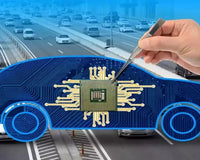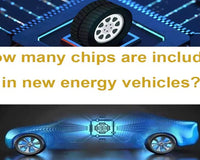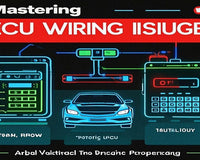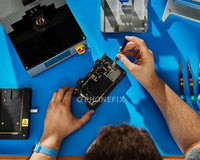Do you know how your car regulates fuel consumption, shifts smoothly, or warns you of engine problems? The answer is the auto ECU chip. This tiny but powerful component is the brain of modern vehicles—managing everything from performance to safety. 
ECU chip is a programmable circuit board that receives data from sensors IC across your vehicle and executes commands to keep systems running optimally. Think of it as a coordinator, if without it, your car’s engine, transmission, and even infotainment would struggle to work together.
Not all ECU chips are the same. Modern cars have multiple ECUs, each specialized for a specific system.
1. Engine Control ECU (ECM).
Engine Control Module (ECM) is the most critical ECU, it’s the "heartbeat" of your engine. It monitors and adjusts fuel injection volume and timing, ignition timing, air-fuel ratio and idle speed, etc. Without a functioning ECM, your engine might stall, waste fuel, or fail to start entirely.
2. Transmission Control ECU (TCM).
Transmission Control Module (TCM) handles your car’s gearbox, whether it’s automatic, manual, or CVT. Its job is to determine when to shift gears, adjust shift smoothness, monitor transmission temperature.
3. Body Control Module (BCM).
Body Control Module (BCM) manages "comfort and convenience" systems, you can think of it as the ECU for your car’s interior and exterior. It controls power windows, locks, mirrors, lighting, climate control, wiper blades.
4. Chassis Control ECU.
The Chassis Control ECU focuses on safety and stability. It works with anti-lock Braking System, Electronic Stability Program System, Traction Control System. Chassis Control ECU is a lifesaver, it helps you stay in control during unexpected driving conditions.
5. Infotainment ECU.
As cars get smarter, the Infotainment ECU has become a must-have. It powers touchscreen displays, audio systems, driver information clusters
6. Hybrid/EV-Specific ECUs.
For electric or hybrid cars, specialized ECUs manage battery and motor systems, monitors battery health, charge level, and temperature or regulates electric motor power to match acceleration and speed.
Regardless, all ECU chips share core roles that keep your car running well.
1. Optimize Performance.
ECUs tailor your car’s behavior to your driving style. For example, when you floor the gas, the ECM increases fuel flow and advances ignition timing for extra power.
2. Real-Time Monitoring & Fault Diagnostics.
ECUs constantly check sensor data for anomalies. If something’s wrong, the ECU will triggers the Check Engine light on your dashboard and stores a diagnostic trouble code (DTC) in its memory. Mechanics use a car scanner to read these codes and fix the issue quickly.
3. Improve Fuel Efficiency.
Modern cars are far more fuel-efficient than older models, and ECUs are a big reason why. By adjusting air-fuel ratio, ignition timing, and transmission shifts, ECUs minimize wasted fuel.
4. Enhance Safety.
ECUs work with safety systems to protect you. The chassis ECU activates ABS within milliseconds if you slam on the brakes, preventing skids. Adaptive cruise control uses the ECU to adjust speed and maintain distance from the car ahead.
As cars evolve such as self-driving tech and AI, ECUs will become more impotant. A luxury or electric car could have 50+ ECUs, which managing everything from self-parking to battery life. Deep understanding their will helps you easier to communicate with mechanics when issues arise. However, it's important for car repair shops to obtain a functional car chip to replace the damaged ECU chip to get the car back to high performance or working properly. The China ecufixtool store can help you get these vulnerable car computer chips.
Do You Know Why ECU Chips Are Critical for Your Car’s Health & Efficiency?










